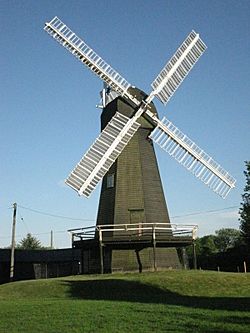Davison's Mill, Stelling Minnis facts for kids
Quick facts for kids Davison's Mill, Stelling Minnis |
|
|---|---|

Davison's Mill, May 2010
|
|
| Origin | |
| Mill name | Davison's Mill |
| Grid reference | TR 146 466 |
| Coordinates | 51°10′38″N 1°04′09″E / 51.17734°N 1.06930°E |
| Operator(s) | Kent County Council |
| Year built | 1866 |
| Information | |
| Purpose | Corn mill |
| Type | Smock mill |
| Storeys | Four-storey smock |
| Base storeys | Low brick base of a few courses |
| Smock sides | Eight-sided |
| No. of sails | Four |
| Type of sails | Double Patent sails |
| Windshaft | Cast iron |
| Winding | Fantail |
| Fantail blades | Six bladed |
| Auxiliary power | Hornsby hot-bulb oil engine since 1923 |
| No. of pairs of millstones | Two pairs |
| Other information | Was last commercially working windmill in Kent. Has the only surviving original hot-bulb auxiliary engine in any windmill in the United Kingdom |
Davison's Mill, also known as Stelling Minnis Windmill, is a special type of windmill. It's a 'smock mill' located in Stelling Minnis, Kent, England. Built in 1866, it is a 'Grade I listed building'. This means it's a very important historical structure.
This mill was the last one in Kent to work for businesses. It stopped grinding grain in the autumn of 1970.
Today, the Stelling Minnis Windmill and Museum Trust manages the mill. This trust started on January 26, 2010. You can visit the mill from Easter Sunday until the end of September. It is open on Sundays and Bank Holidays, from 2 PM to 5 PM. The mill's grounds also host the yearly Stelling Minnis fete.
History of Davison's Mill
Davison's Mill was built in 1866 by Thomas Holman. He was a millwright from Canterbury, which means he built and repaired mills. This new mill replaced an older, simpler type of windmill.
Milling, or grinding grain using wind power, stopped in 1925. However, the mill kept working with an oil engine. This engine was added in 1923.
In April 1935, the mill was fixed up to work fully again. A person named H. Laurie paid for this work. It was a way to remember her brother, Colonel Ronald Macdonald Laurie, who had passed away. H. Laurie received a special award for helping save the windmill.
In the early 1950s, strong winds blew off one pair of the mill's sails. After that, the mill worked with only one pair of sails. The oil engine helped it to keep going. The local council even gave money to help with repairs.
When Alec Davison, the miller, retired in the autumn of 1970, Davison's Mill was the last working windmill in Kent. After Mr. Davison passed away, Kent County Council took over the mill.
A big project to restore the mill started in 2003. The sails were taken down on July 19, and the top part, called the cap, was removed on July 20. This restoration was paid for by the Heritage Lottery Fund and Kent County Council. The work was done by IJP Millwrights and took three months to finish.
How the Mill Works
Davison's Mill is a four-storey smock mill. It has a platform, or 'stage', on the first floor. The mill sits on a low brick base, which is about 14 inches (350 mm) high. The whole mill stands about 43 feet (13 meters) tall to the very top.
It has four large 'patent sails'. These sails are attached to a strong cast-iron shaft called a windshaft. A special part called a fantail helps turn the mill's cap. This makes sure the sails always face the wind.
Inside, the mill uses the wind's power to turn two pairs of millstones. These stones grind grain into flour. The main gear, called the Brake wheel, is made of iron. This wheel turns another gear, the Wallower. The Great Spur Wheel, also made of cast iron, then helps power the millstones.
The mill also has a special engine. It's a "1912" hot-bulb engine made by Ruston & Hornsby. This engine was sent to the mill in Canterbury on May 7, 1923. It helped the mill work even when there wasn't enough wind.
Millers of Davison's Mill
- Colver (worked the older post mill)
- George Goble (1866 - 1878)
- Henry William Davison (1878 - unknown)
- Alec Davison (1940 - 1970)
 | Jackie Robinson |
 | Jack Johnson |
 | Althea Gibson |
 | Arthur Ashe |
 | Muhammad Ali |

